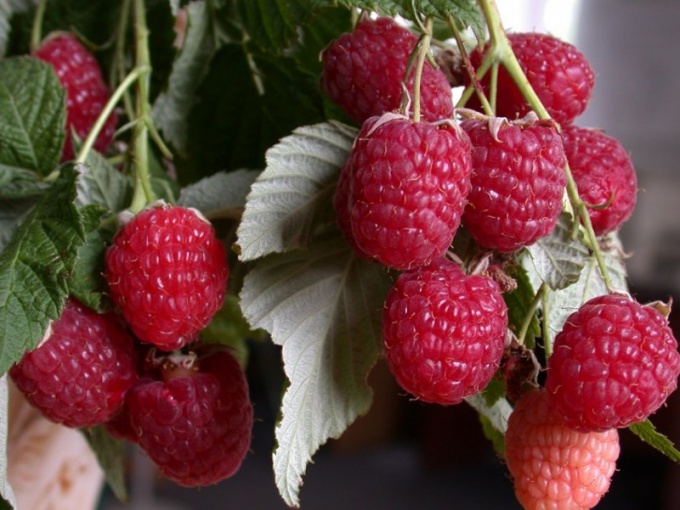Raspberries, like any other garden culture, will enjoy its delicious fruit only with proper care. Speaking specifically about the remontant varieties of this shrub, the care is reduced to the timely mulching, tilling the soil and watering.
Timely mulching is the key to a rich harvest, to produce this simple procedure should in the autumn months – preferably before the first frost.
What does this unusual word? In fact, mulching is nothing like the shelter of the soil around the plant, the purpose of which is to protect its root system icy winter, the support of the uniform temperature of the soil during the hot summer months, maintaining the necessary moisture and prevent weed growth.
When carrying out mulching the soil around the plant (the diameter of the mulch can be 30-50 centimeters) is covered with a layer of compost, peat, sawdust, hay, compost, shredded stalks of plants and other natural materials.
For mulching you can use some synthetic materials, which can be purchased in stores for gardeners. It could be a black plastic film (that is black is applied in order to through it does not pass the sunlight) or a special fabric based on synthetic fibers: "lutrasil", "agril", "agrosa", "spunbond" and others.
To get from the Bush remontant raspberry good harvest twice a year, it is necessary to make a careful tillage and weeding of the soil around the plant. The purpose of these simple procedures is to provide free access of air to the root system of the Bush raspberries, thereby creating favorable conditions for development in all kinds of soil beneficial microorganisms.
Loosen the soil should be early in the spring before the first buds bloom. The best tool for loosening is a small hack using which you can easily work the soil to a depth of 10-15 centimeters. Summer weeding and loosening of soil is done in order to destroy near the Bush shoots weedy plants: couch grass, pigweed and others.
Remontant raspberry loves moisture, so it must be frequently watered. Careful, daily watering should be done in the hot summer months. Saturate raspberries Reviver need and during flowering, and during fruit ripening and after harvest.
Mulching
Timely mulching is the key to a rich harvest, to produce this simple procedure should in the autumn months – preferably before the first frost.
What does this unusual word? In fact, mulching is nothing like the shelter of the soil around the plant, the purpose of which is to protect its root system icy winter, the support of the uniform temperature of the soil during the hot summer months, maintaining the necessary moisture and prevent weed growth.
When carrying out mulching the soil around the plant (the diameter of the mulch can be 30-50 centimeters) is covered with a layer of compost, peat, sawdust, hay, compost, shredded stalks of plants and other natural materials.
For mulching you can use some synthetic materials, which can be purchased in stores for gardeners. It could be a black plastic film (that is black is applied in order to through it does not pass the sunlight) or a special fabric based on synthetic fibers: "lutrasil", "agril", "agrosa", "spunbond" and others.
Loosening and timely watering
To get from the Bush remontant raspberry good harvest twice a year, it is necessary to make a careful tillage and weeding of the soil around the plant. The purpose of these simple procedures is to provide free access of air to the root system of the Bush raspberries, thereby creating favorable conditions for development in all kinds of soil beneficial microorganisms.
Loosen the soil should be early in the spring before the first buds bloom. The best tool for loosening is a small hack using which you can easily work the soil to a depth of 10-15 centimeters. Summer weeding and loosening of soil is done in order to destroy near the Bush shoots weedy plants: couch grass, pigweed and others.
Remontant raspberry loves moisture, so it must be frequently watered. Careful, daily watering should be done in the hot summer months. Saturate raspberries Reviver need and during flowering, and during fruit ripening and after harvest.
